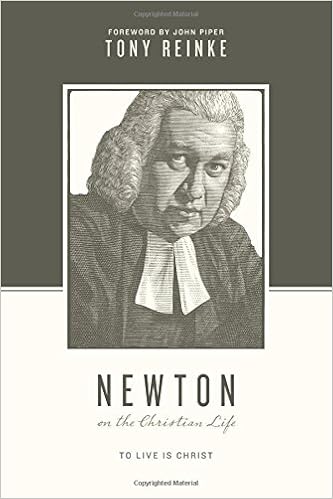
Newton
on the Christian Life by Tony Reinke
Many Christians know the name John Newton by the
perennial hymn ‘Amazing Grace,’ but what they do not know is that Newton’s life
is quite a remarkable story. Tony
Reinke, in his new book on Newton entitled, Newton
on the Christian Life, writes with clarity and encouragement for all those
wanting to know Newton more and to see in his life a devoted follower of
Christ. The book delves into his
shipwreck of a life in the slave trading industry and also his work with
William Wilberforce, but focuses more acutely on how Newton saw the varied
Christian life, from its sorrows to its joys.
What is often not known about Newton is that he was
an extraordinary pastoral letter writer.
Reinke notes, “Newton’s superb letter-writing skills, marked with
spiritual clarity, self-deprecating wit, vivid metaphor, motive-piercing
acuity, and insights of blazing glory, all help to explain why Newton’s
pastoral influence spread far beyond the village of Olney, beyond the city of
London, beyond the eighteenth century, and now guides modern-day pastors in
culturally sophisticated places like Manhattan. If Keller and Packer are right,
Newton should be named among the most skilled pastors in church history (27).” Although his sermons might not have been
exciting or life-changing, his letters to everyday parishioners were practical
theology at its best, taking their cues from the Scriptures and
experience. Reinke points to the all-sufficiency
of Christ for all of life as the central aim of Newton’s letters (31). One of the most powerful things about Newton’s
letters are his keen sensitivity to get to the heart of matters with compassion
and directness, a combination that is rare today.
The all-sufficiency of Christ is central to Newton’s
thought. At the end of his life as he
visited with up and coming preacher William Jay, Newton tired from life said, ““My
memory is nearly gone, but I remember two things: that I am a great sinner and
that Christ is a great Savior (56).” The
greater abundance of grace found in Christ outweighs any heaviness in regards
to sin and transgression. Greater grace
abounds because Christ abounds. Further,
Newton taught that at the heart of biblical faith was the divinity of
Christ. Newton wrote, “Christ incarnate
is the full revelation of God in the flesh. This truth is so important that no
matter how religious you are, if you are without Christ, you are without God—an
atheist (Eph. 2:12) (58).”
If you want a sure guide to the life of Newton, the
way he saw the Christian life, this book is for you.
Thanks to Crossway for the copy of this book in
exchange for an honest review.
Comments
Post a Comment